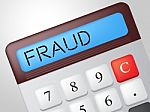 While both large and small businesses can fall victim to fraud, its small businesses that are at the highest risk, with a frequency around 31 percent, according to Association of Certified Financial Examiner’s (ACFE) 2012 Report to the Nations.
While both large and small businesses can fall victim to fraud, its small businesses that are at the highest risk, with a frequency around 31 percent, according to Association of Certified Financial Examiner’s (ACFE) 2012 Report to the Nations.
The report states that the most common types of fraud amongst small businesses are billing fraud, corruption, check tampering, skimming and expense reimbursement fraud.
Sadly enough, close to half of the fraudulent individuals had been with the company between one and five years.
Breakdown of fraud in the workplace: The ACFE found that of those that are guilty of fraud, 42 percent are employees, 38 percent are managers and 18 percent are business owners or executives.
Fraud Can Occur Just About Anywhere
Surprisingly, even physicians can be affected by fraudulent acts.
The article “Physicians and Stolen Tax Returns: Avoiding medical malpractice fraud” states that physicians in Texas, in addition to other states, are victims of bogus filers that are trying to scheme millions of dollars from the federal government.
While typically the physicians aren’t responsible for these acts, being a victim of fraud takes a tremendous toll on one’s life by adding an immense amount of stress that could have been avoided.
How to Stay a Step Ahead of Fraud
For individuals, such as the physicians mentioned above, they can protect themselves by contacting the Identity Protection Specialization Unit and filing a complaint with the Federal Trade Commission, the US Department of Justice and the Social Security Administration.
Businesses can protect themselves by:
- Use highly-secured computers – For all banking and financial duties, you should have a computer strictly for those needs and those needs only. No surfing the web, no sending emails and no playing games. Install antivirus software on the computer to prevent your information from being hacked.
- Keep tabs on your money and personal information – Never wire money unless you know for sure that the recipient can be trusted. Also, do not give out your personal business information to those that you do not know. Check all your bank statements on a regular basis to make sure there is nothing sketchy going on with your accounts.
- Always perform background checks on employees – Ensure that their past is clear by performing background checks on all potential employees.
- Insist employees take time off – A main characteristic of a fraudulent employee is someone who insists on never taking any time off of work. The reason being is that they do not want anyone else doing their job for them and perhaps catching them in their fraudulent activities. Have employees work in teams and check each other’s work regularly.
- Encourage an honest environment – By encouraging honesty throughout your company, keeping tabs on employees and even setting up an anonymous “fraud tip” phone line, you lesson your business’s chances of falling victim to fraud.
While fraud cannot always be prevented, it does tend to happen more often in businesses that are not actively trying to avoid it.
Always have your guard up, follow your accounts closely and if you suspect something suspicious, confront that employee immediately.
Photo credit: Image courtesy of Stuart Miles at FreeDigitalPhotos.net
About the Author: Sarah Brooks is a freelance writer living in Charlotte, NC. She writes on a variety of topics including small business, social media and personal finance.
